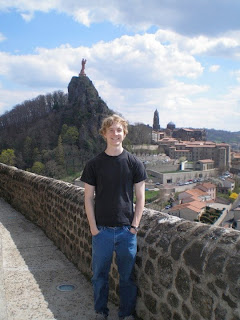 |
| Steve shares his unique transit experiences. |
Europe does transportation very, very well. Trains, parallel roads covered in tramlines above subway stops. The amount of tourist and travel traffic means that they’re always crowded. The European pension to strike over just about anything makes them even more so.
Sew a big Canadian flag on your backpack and you’re bound to meet people. Mostly other Canadians. There’s some atavistic urge in us to escape our giant, empty country for the exotic hustle-bustle of Europe. You meet people in hostels, but you also meet going to hostels.
Europe is a hub of tourists. Even the small, quaint villages usually have exchange students or backpackers getting off the beaten trail. Everyone goes everywhere and they all speak English, or at least broken English that isn’t as good as your French but they’ll insist on speaking it anyway. Meeting new people while travelling gives a sense of moving forward, of exploring toward a destination. A feeling of accomplishment and possibility at the same time. At the destination you get lost in the crowd. But on the way there, you’re a part of it.
I'm going to share with you the things that you may or may not experience while in transit in Europe.
Sew a big Canadian flag on your backpack and you’re bound to meet people. Mostly other Canadians. There’s some atavistic urge in us to escape our giant, empty country for the exotic hustle-bustle of Europe. You meet people in hostels, but you also meet going to hostels.
Europe is a hub of tourists. Even the small, quaint villages usually have exchange students or backpackers getting off the beaten trail. Everyone goes everywhere and they all speak English, or at least broken English that isn’t as good as your French but they’ll insist on speaking it anyway. Meeting new people while travelling gives a sense of moving forward, of exploring toward a destination. A feeling of accomplishment and possibility at the same time. At the destination you get lost in the crowd. But on the way there, you’re a part of it.
I'm going to share with you the things that you may or may not experience while in transit in Europe.
- During the French train strike when we got on the only train leaving Geneva for Lyon that day, there was standing room only and a crush of other young kids. A few sang traveling songs, more broke out booze and a few joined our card game which didn’t work at all due to the train’s jostling.
- You’d take the metro in a new city and someone would shout out, “Hey, Canadian?” and they’d be beaming and usually from the Maritimes.
- They’d usually know a better hostel than the one you were going to. Then when you were taking the tram or the bus to the bar later there would be someone speaking English with a large suitcase or bag and you’d get to talking to them too.
- They’d know a great bar or a party some Spanish guy invited them to that’s at a strange club with photographs tiling the walls and people wearing strange, extravagant clothing. And you could get there because you can get anywhere on public transport in those tiny countries.
Steven Parker is in his fourth year at Wilfrid Laurier University. He studies languages and during the winter term of 2010 he studied for a semester at l'Universite Jean Monnet in St. Etienne, France.
